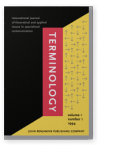Vol. 1:1 (1994) ► pp.61–95
Positional and combinational characteristics of terms
Consequences for corpus-based terminography
Special-language term formation is characterised, inter alia, by the frequent reuse of certain lexical items in the formation of new syntagmatic units and by conceptually motivated restrictions on the position which certain elements can occupy within a compound term. This paper describes how the positional and combinational features of the terminology of a given domain can be identified from relevant existing term lists and used as part of a corpus-based, automatic term-identification strategy within a natural-language processing (e.g., machine-translation) system. The methodology described is exemplified and supported with data from the field of satellite communications.
Cited by (3)
Cited by 3 other publications
This list is based on CrossRef data as of 10 july 2024. Please note that it may not be complete. Sources presented here have been supplied by the respective publishers. Any errors therein should be reported to them.
